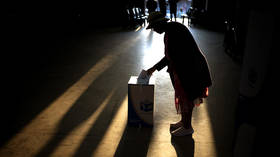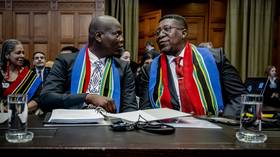Non-alignment juggernaut: This major BRICS member is braced for a post-election period
The formation of a coalition government in South Africa means the country’s foreign policy will be under scrutiny from internal partners
South African President Cyril Ramaphosa has attempted to wrap up his international relations department in cotton wool as the country embarks on a process of working through a Government of National Unity (GNU).
The results of the national elections on May 2 meant that the African National Congress (ANC), the party led by Ramaphosa, has to share power with opposition parties, especially those that hold diametrically opposing positions on how the country should respond to pressing international developments.
Who is who in coalition government
In early July, Ramaphosa announced his new cabinet after several weeks of intense negotiations between the ANC and ten other parties that constitute the GNU. This new cabinet now has 32 positions and, out of the 11 parties in the GNU, seven are represented in the cabinet.
The ANC has 20 portfolios, which include the key ministries of finance, justice, presidency, police, and defence. Eleven ministers and ten deputy ministers in the cabinet are not from the ANC.
The eleven parties of the GNU are the African National Congress (ANC), Democratic Alliance (DA), Patriotic Alliance (PA), Inkatha Freedom Party (IFP), Good Party, Pan Africanist Congress of Azania (PAC), Freedom Front Plus (FF+), United Democratic Movement (UDM), Al Jama-ah, Rise Mzansi, and the United Africans Transformation (UAT).
Despite the ANC winning 40.18% of the popular vote, it has 20 of the cabinet seats, giving it a disproportionately high 62.5% of ministerial portfolios. By contrast, the main opposition party, the DA, won 21.81% of the vote and has six seats or 18.75% of the cabinet posts, while the IFP won only 3.85% of the vote but holds two ministries or 6.25% of the overall cabinet.
All of the parties have signed a statement of intent, which spells out how the GNU will operate, especially when it comes to policy and decision making.
To try and offset any confusion that may arise, Ramaphosa’s Minister in the Presidency Khumbudzo Ntshavheni said in a briefing that no one has the authority to operate as they please, but decisions will be made collectively.
The DA, FF+ and PA’s views on international relations differ markedly to the ANC’s, with the those parties taking a pro-West and pro-Israel stance, while the ANC prefers a foreign policy that is non-aligned and is aimed at contributing to the creation of a just, peaceful, and equitable world.
New foreign minister, same agenda?
Ramaphosa’s new Minister of International Relations and Cooperation Ronald Lamola used his first speech to emphasize that the country remains committed to a foreign policy guided by human rights, constitutional principles, and the national interest, as well as solidarity and the peaceful resolution of conflict.
“The evolving international world order necessitates strengthening the non-aligned movement. South Africa’s policy of active non-alignment is not reactive but an affirmative agenda. It is not about being neutral or abstaining from world affairs but putting forward a unifying agenda through dialogue to achieve peace for developing countries that do not wish to take sides in great power rivalry,” Lamola said.
At 40, he is one of the youngest members of the new cabinet. The former minister of justice has replaced Naledi Pandor, who was renowned for her diplomatic prowess and notable achievements, including spearheading South Africa’s case against Israel at the International Court of Justice (ICJ) over genocide against Palestinians.
His appointment is expected to be a continuation of the South African government’s policy of promoting peaceful co-existence and a steadfast stand against all forms of colonialism and the right of people to self-determination.
While coalition partners have been placed as deputies or ministers in certain departments, Lamola has two deputy ministers who are from his party, the ANC – a strong indication that Ramaphosa does not want policy confusion to sully the government’s stance on international relations.
If the GNU does not present a united front on pressing global developments, political opposition forces could easily criticize and undermine the country’s international relations. A lack of consensus could possibly lead to a less decisive, incoherent approach – especially if the institutional links between the executive and legislative arms of foreign policy making are subject to the GNU’s principle of sufficient consensus.
The coalition government could avoid a tricky situation if it pre-empts these pitfalls, and agrees to allow major foreign policy decisions to be made by a single party, in this case the ANC.
Lamola and the ICJ case
During the ICJ hearing on the case of Israeli genocide against the Palestinian people in Gaza in January 2024, then Minister of Justice Lamola led the arguments for South Africa, supported by Pandor. At the ICJ, South Africa called the attack in Gaza tantamount to genocide and declared that the people of Palestine had a right to seek self-determination through armed struggle.
On January 26, 2024, the court ruled on a number of interim steps which South Africa had asked it to take against Israel. The key request was for the court to order Israel to immediately halt operations in Gaza, but the court did not comply.
However, it did instruct Israel to prevent its military from committing acts which might be considered genocidal, to prevent and punish incitement to genocide, and to allow humanitarian assistance to reach the people of Gaza.
The court also ruled that it had the legal right to proceed with the genocide case, although a final verdict on the case could take several years.
On July 19, the ICJ issued an advisory opinion, which emanated from a request by the United Nations General Assembly on December 30, 2022 and which unanimously reaffirmed its jurisdiction on the matter and that the State of Israel’s continued presence in the Occupied Palestinian Territory was unlawful under international law.
The court was of the view that the effects of Israel’s policies and practices, and its exercise of sovereignty over certain parts of the Occupied Palestinian Territory, constitute an obstruction to the exercise by the Palestinian people of their right to self-determination. This includes Israel’s annexation of parts of the Occupied Palestinian Territory, the fragmentation of this territory, undermining its integrity, the deprivation of the Palestinian people of the enjoyment of the natural resources of the territory, and its impairment of the Palestinian people’s right to pursue its economic, social and cultural development.
Lamola said the ruling by the ICJ affirmed South Africa’s long-standing position that the occupation by Israel of Palestinian territory remained unlawful under international law.
“The international community must act to bring an immediate end to the occupation and the gross violations of international humanitarian and human rights law being perpetrated by Israel against the Palestinian people. There is now an additional legal obligation for all states to end complicity in Israel’s illegal actions and to act to ensure respect for international law.
“State parties particularly condemn racial segregation and apartheid and undertake to prevent, prohibit and eradicate all practices of this nature in territories under their jurisdiction.
“This finding of the court reaffirms that the Israeli Government is guilty of practising the crime of apartheid, as the court put it,” Lamola said.
Conflict between Russia and Ukraine
Lamola has maintained that non-aligned countries are useful mediators in conflicts like that between Russia and Ukraine, saying that sovereign nations seek independent foreign policies aligning with their developmental priorities.
“The impact of the ongoing war between Russia and Ukraine has been felt globally, most notably on the African continent, as it has led to significantly increased consumer prices, particularly of food and energy,” he said.
“This underscores the critical need for immediate global cooperation to end conflicts and address their current economic impact.”
He said South Africa and other developing countries were more cognisant than ever that economic prosperity largely depends on “stability, peace, and respect for the rule of law.”
He added that the country would continue to engage the world as equals and that its “non-alignment” and “universality” posture would remain sacrosanct.
Last year, South Africa coordinated the first-ever Africa Peace Initiative beyond the continent’s borders when President Ramaphosa led a delegation of six African heads of state to Ukraine and Russia.
The delegation from South Africa, Egypt, Senegal, Congo-Brazzaville, Comoros, Zambia, and Uganda put forward a ten-point proposal, including a recognition of Russia and Ukraine’s sovereignty and continued unhindered grain exports.
They also called for a de-escalation of fighting and for negotiations to commence with urgency, for the release of prisoners of war, and for greater humanitarian support, among other requests.
Political analyst Professor John Molepo from the North-West University told RT it was important that the country has a coherent international relations policy and that any instability in decision making would prove disastrous.
“The government has its own existing policies and the parties that now form the GNU will form part of it… the only way they can change the country’s stance on international relations is through the parliament, and this will require a clear majority.
“I think it’s going to be difficult for the opposition parties who are part of the GNU to make drastic changes to the country’s stance on international relations.”
Molepo said it was clear that the ANC does not want a sense of confusion in its international relations policy, especially if it undermines any standing agreements.
“It is unlikely that the ANC will lose their sense of what they stand for and what they believe in, particularly with international relations,” he told RT.







Comments are closed.